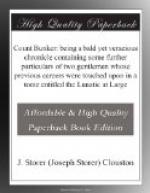Sir Justin rose and led his daughter to the door.
“You will have an opportunity to-morrow,” he replied stiffly. “In the meantime I shall leave you to the enjoyment of the joke.”
“But, my dear sir——”
Sir Justin turned his back, and the door closed upon him again.
Count Bunker’s position was now less supportable than ever.
“Escape I must,” he thought.
And hardly had he breathed the word when a gleam of his old luck seemed to return. He was standing by the window, and presently he observed a groom ride up on a bicycle, dismount, and push it through an outhouse door. Then the man strolled off, and he said to himself, with an uprising of his spirits—
“There’s my steed—if I could once get to it!”
Then again he thought the situation over, and gradually the prospect of a midnight ride on a bicycle over a road he had only once traversed, clad in his emblazoned socks and blue-lapelled coat, appeared rather less entertaining than another night’s confinement. So he lit his last cigar, threw himself on the bed, and resigned himself to the consolations of an innocent heart and a practical philosophy.
CHAPTER XXXII
The clearness of the Count’s conscience may be gauged when it is narrated that no sooner had he dismissed the stump of his cigar toward the grate than he dropped into a peaceful doze and remained placidly unconscious of his perils for the space of an hour or more. He was then awakened by the sound of a key being gently turned, and his opening eyes rested upon a charming vision of Julia Wallingford framed in the outline of the door.
“Hush!” she whispered; “I—I have brought a note for you!”
Smoothing his hair as he met her, the Count thanked her with an air of considerable feeling, and took from her hand a twisted slip of paper.
“It was brought by a messenger—a man in a kilt, who came in a motor car. I didn’t know whether father would let you have it, so I brought it up myself.”
“Is the messenger waiting?”
“No; he went straight off again.”
Unrolling the scrap he read this brief message scrawled in pencil and evidently in dire haste—
“All is lost! I am prisoner! Go
straightway to
London for help from my Embassy.
“R.
Von B.”
“Good heavens!” he exclaimed aloud.
“Is it bad news?” asked Julia, with a solicitude that instantly suggested possibilities to his fertile brain.
“Horribly!” he said. “It tells of a calamity that has befallen a very dear friend of mine! Oh, Rudolph, Rudolph! And I a helpless prisoner!”
As he anticipated, this outburst of emotion was not without its effect.
“I am so sorry!” she said. “I—I don’t believe, Count Bunker, you are as guilty as father says!”




